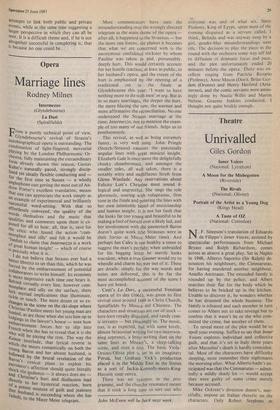Opera
Marriage lines
Rodney Milnes
Intermezzo (Glyndebourne) La Dori (Spitalfields)
From a purely technical point of view, Glyndebourne's revival of Strauss 's autobiographical opera is outstanding. The combination of light-fingered, mercurial Playing by the London Philharmonic Or- chestra, fully maintaining the extraordinary form already shown this season, Gustav Kuhn's naturally paced, strongly discip- lined yet ideally flexible conducting and for the first time in Sussex — a wholly anglophone cast getting the most out of An- drew Porter's excellent translation, means that one can appreciate the work simply as an example of experimental and brilliantly successful word-setting. With that so effortlessly conveyed, the quality of the words theMselves and the musicthat
i
qualifies and comments upon them is ex- Posed for all to hear, all, that is, save for the critic who found the action 'corn- emplace and silly' and felt it would be foolish to claim that Intermezzo is a work of great human insight' — which of course
Precisely what it is.
do not believe that Strauss ever had a better libretto to set than this, which he was forced by the embarrassment of potential c. ollaborators to write himself. Its economy more impressive each time one hears it. Behind virtually every line, however com- monplace and silly on the surface, there la. rk myriad implications that illuminate, tickle or touch. The mere dozen or so ex- changes in the scene on the ski-slope where hristine/Pauline meets her young man are loaded, as are those when she sets him up in lodgings in the lawyer's house — note how mbarrassment forces her to slip into Prench when she has to reveal that it is she who will be paying the rent. The way the 4a'n in interlude, that lyrical reverie in which she muses romantically on both the Y,.0Ung Baron and her absent husband, is followed by the brutal revelation of the Patr aron's cynical plans to exploit , his shock affection should quite literally hock the audience — it always does me - and Christine's hurt and disillusion lead of to her hysterical reaction, born u,,t a Potent mixture of guilt and jealousy (her husband is succeeding where she has failed), to the Mieze Meier telegram. Most commentators have seen the misunderstanding over the wrongly directed telegram as the main theme of the opera after all, it happened to the Strausses — but the more one listens, the plainer it becomes that what we are concerned with is the anonymous confidence trickster by whom Pauline was taken in and, presumably, deeply hurt. This would certainly account for her hostile reaction, at least in public, to her husband's opera. and the extent of the hurt is emphasised by the opening of a traditional cut in the finale at Glyndebourne this year: `I want to have nothing more to do with men' et seq. But as in so many marriages, the deeper the hurt, the more blazing the row, the warmer and more affirmative the reconciliation. No one understood the Strauss marriage at the time; Intermezzo, not to mention the exam- ple of too many of our friends, helps us to posthumously.
This revival, as well as being extremely funny, is very well sung. John Pringle (Storch/Strauss) caresses the potentially angular lines with great musical insight, Elizabeth Gale is once more the delightfully cheeky chambermaid, and amongst the smaller roles, all well taken, there is a notably witty and mellifluous Stroh from Glenn Winslade. Any reservations about Felicity Lott's Christine must sound il- logical and ungrateful. She sings the role gloriously, soaring with voluptuous, firm tone in the finale and pointing the lines with her own inimitable blend of musicianship and human insight. It is not her fault that she looks far too young and beautiful to be making a fool of herself over a likely lad, and her involvement with the gaunerisch Baron doesn't quite work (the Strausses were in their forties at Mieze Meier time). And perhaps Ian Caley is too healthy a tenor to suggest the man's perfidy; when unbraided for his begging letter he merely looks truculent, when a true Gauner would try to wheedle and charm his way out of it. These are details: simply for the way words and notes are delivered, this is by far the most accomplished account of the score I have yet heard.
Cesti's La Dori, a successful Venetian opera of its day (1661), was given its first revival since around 1688 in Christ Church, Spitalfields by Musica net Chiostro. The characters and situations are out of stock — love-lorn royalty disguised, and randy com- ic servants — but pleasingly so. The music, too, is as expected, but with some lovely, almost Straussian writing for two intertwin- ning sopranos, a letter-writing duet on the same lines as Mozart's, a sleep-talking scene, and even a trio. The basic Viola/ Orsino/Olivia plot is set in an imaginary Persia, but Graham Vick's production placed it in the Middle East in the Sixties as a sort of Jackie-Kennedy-meets-King- Hussein soap opera.
There was no synopsis in the pro- gramme, and the churchy resonance meant that it took a long time to sort out who e■teryone was and of what sex. Since Ptolemy, King of Egypt, spent most of the evening disguised as a servant called, I think, Belinda and was anyway sung by a girl, gender-blur misunderstandings were rife. The decision to play the piece in the round with the orchestra some way off led to diffusion of dramatic focus and pace, and the plot unfortunately ended 20 minutes before the opera. There was ex- cellent singing from Patricia Rozario (Ptolemy), Anne Mason (Dori), Brian Gor- don (Oronte) and Henry Herford (Arta- xerxes), and the comic servants were amus- ingly done by Nuala Willis and Martin Nelson. Graeme Jenkins conducted, I thought not quite briskly enough.


















































 Previous page
Previous page